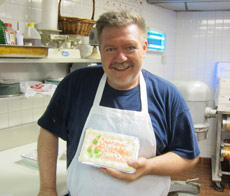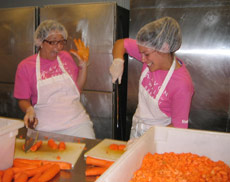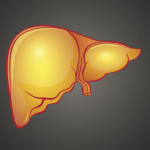When she founded God’s Love We Deliver in the late 1980s, Ganga Stone could be spotted on her bicycle transporting hot food to New Yorkers depleted by HIV/AIDS. Stone was a hospice worker called to action not by religious faith—the organization is secular—but because she met Richard Sayles, a man dying of AIDS, and realized that being critically sick and hungry was a crisis that demanded an urgent response. In the process of meeting that need, she created a New York institution that today delivers more than 1 million meals each year.
Stone’s compassion offered both nourishment and dignity to people living with the virus, and her approach resonated with others who helped build the organization by her side. This year, as God’s Love We Deliver (GLWD) celebrates its 25-year anniversary, the organization continues to provide nutritious meals to the seriously ill—one third of its clients live with HIV/AIDS, while others deal with critical diagnoses such as cancer and Alzheimer’s—but the nonprofit’s history also tells us something else: For those who are able, giving back can provide a unique kind of nourishment all its own.  “This is family,” said Chuck Piekarski, who has enjoyed a 20-year tenure as head baker at GLWD. Known simply as “Chuck the Baker,” he is particularly emblematic of his profession, with his well-built frame, strong hands and rosy cheeks from the heat of the kitchen, especially when he’s in an apron decorating trays of birthday cakes. Chuck decorates a small cake for each client’s birthday—a signature touch that distinguishes the organization’s caring approach. The term “family” extends to the close-knit veteran volunteer network that Chuck depends on every day. “We can’t run [this place] without the volunteers,” he explained with an open smile.
“This is family,” said Chuck Piekarski, who has enjoyed a 20-year tenure as head baker at GLWD. Known simply as “Chuck the Baker,” he is particularly emblematic of his profession, with his well-built frame, strong hands and rosy cheeks from the heat of the kitchen, especially when he’s in an apron decorating trays of birthday cakes. Chuck decorates a small cake for each client’s birthday—a signature touch that distinguishes the organization’s caring approach. The term “family” extends to the close-knit veteran volunteer network that Chuck depends on every day. “We can’t run [this place] without the volunteers,” he explained with an open smile.
The headquarters of GLWD is a two-story brick building on the corner of Spring Street and Sixth Avenue in SoHo renovated in 1993—the year New York City experienced its peak of 12,745 new AIDS diagnoses. Chuck’s domain is an isolated corner of the nearly 5,500-square-foot basement kitchen, undoubtedly the structure’s most warming feature. When he started 20 years ago, the nonprofit’s hearth was a small church basement on 86th Street and the organization served roughly 300 clients. Today, GLWD serves an estimated 2,000 regular clients, and the nonprofit’s administrators have had to get creative to accommodate the Herculean output that their growing client base demands. A large, 33-foot-long freezer trailer is parked behind the building, a symbol of the nonprofit’s insatiable need for storage space for its frozen meals. Several offices are also being refitted as walk-in freezers.
Frozen meals are now the staple of what God’s Love provides because they are more easily preserved. The frozen model offers clients a greater selection of meals to choose from and gives them more flexibility in picking delivery times. It also frees up space in moderately sized kitchen so Chuck can serve far more people with individually tailored meals. During the early years of the AIDS epidemic, he explained, everyone was focused on delivering hot, high-calorie meals. “We were trying to give them more to eat because wasting was a big issue back then. People needed to eat whatever they could get down,” he said.
The first person with AIDS he cared for was his partner Allen. “I tried to come up with anything that he could eat,” Chuck said, illustrating a scene that is uncomfortably familiar to anyone who has watched someone die slowly from a debilitating disease. “I had different juices and smoothies and milkshakes. He would try to sip them…. But after a while, he just got weaker and weaker.” Allen, who was a teacher before he got sick, eventually died in Providence where he and Chuck lived at the time. A tile with a heart and Allen’s name on it is displayed above Chuck’s workstation.  Many of the people who work and volunteer for GLWD have lost someone to a serious illness. The organization is a unique conduit for grief because it helps translate painful emotions into positive energy. Volunteers honor the memories of those they have lost by providing dignity and care to people who are sick. Hand-painted tiles with names and red hearts, like the one honoring Allen, dapple the clean white walls throughout the kitchen. Although grief may have introduced some volunteers to God’s Love (other folks may know the nonprofit through the very public support of comedian Joan Rivers), those who donate their time now revel in the social aspect of their labor—they’re clearly having fun—which is a key component in the logistics of managing a volunteer work force of 7,600. You want to attract people who want to keep coming back.
Many of the people who work and volunteer for GLWD have lost someone to a serious illness. The organization is a unique conduit for grief because it helps translate painful emotions into positive energy. Volunteers honor the memories of those they have lost by providing dignity and care to people who are sick. Hand-painted tiles with names and red hearts, like the one honoring Allen, dapple the clean white walls throughout the kitchen. Although grief may have introduced some volunteers to God’s Love (other folks may know the nonprofit through the very public support of comedian Joan Rivers), those who donate their time now revel in the social aspect of their labor—they’re clearly having fun—which is a key component in the logistics of managing a volunteer work force of 7,600. You want to attract people who want to keep coming back.
God’s Love We Deliver distinguishes itself from other nonprofits in that it also resembles a manufacturing company—its footprint is measurable in meals delivered, clients served, or alternatively by counting the number of chickens and bags of carrots handled by the kitchen in a single month. Meal output has grown 40 percent during the past years three years, which can be directly connected to how the economic recession has hit New Yorkers, leaving many people financially vulnerable.
But the nonprofit was ahead of the curve in learning that serious illness is a great equalizer—even for people who previously enjoyed successful careers. A debilitating illness can put you out of work while medical bills and debts can escalate with frightful speed. Malnutrition has become a leading cause of hospital readmission because many people aren’t healthy enough to work when they are discharged and are unable to care for themselves. That’s where God’s Love steps in. Not only does the organization provide meals for free—it also maintains a no-waiting-list policy. This ensures that every critically ill client who contacts GLWD receives an initial supply of food on the next delivery day.
With the advent of protease inhibitors in 1995, God’s Love began to see a shift in the needs of their clients with HIV/AIDS. People were still dying—GLWD board member Jeffrey Diglio died of AIDS complications in January of this year—but not at the same staggering rates. Instead of the high-calorie meals for pure survival, people now needed nutritious meals to help increase the effectiveness of the new antiretroviral medications. For Chuck, that meant reducing the sugar he added to GLWD’s baked goods and replacing it with applesauce or other healthy substitutes.
God’s Love hired a team of registered dieticians to give meals nutrition-enhancing makeovers and assess portions and ingredients. That practice was further streamlined when the organization expanded the range of illnesses that it covered. Different illnesses, they found, have very different dietary requirements. GLWD is the only organization in New York that prepares meals specific to clients’ medical requirements, while still honoring its tradition of cooking food that clients are excited to eat.
“There’s the regular food. There are modified special meals. There’s minced, pureed, vegetarian…” explained God’s Love’s president and CEO Karen Pearl, listing off just a few of the meal categories. The decision to expand God’s Love’s mission to other disease categories occurred before Pearl began her job in 2006, but she was charged with building upon the existing nutrition program and overseeing an increasingly individualized process of preparing and delivering meals. “We had learned so much about helping sick people through nutrition and food that we had a huge expertise we could apply to other illnesses,” she explained.
Over the years that expertise has multiplied. When clients sign on with GLWD’s meal program they get a nutrition assessment within 72 hours. Nutritionists first check to see if clients are in care and make sure a doctor is tracking their progress. The client’s nutritional health is also tracked twice each year via a survey supervised by registered dieticians, who also offer unlimited nutrition counseling by phone. Each survey is immediately entered into the client database so that any major changes or new medications are accounted for when meals are packed. Not only are dieticians able to help clients by drawing from their records, but they are also able to see trends and incorporate them in the nutritional guides that they prepare for different diseases.
“What we found was that as people with HIV/AIDS started to live longer, they [often] developed secondary illnesses,” Pearl explained. “And what we had learned about feeding people with these other illnesses could now be applied back to people with HIV/AIDS.”
GLWD’s nutrition guide for people living with HIV/AIDS now includes sections on obesity, bone health, oral health, diabetes and aging with the virus. “Sometimes, even if somebody is HIV positive or living with AIDS, the reason that they’re on our program is the other illness, or at least it’s a confounding variable,” Pearl said. “Two people with HIV might get totally different meals.”
God’s Love has also developed a grocery bag program for medically stable clients with HIV in New York City. The new once-a-week grocery delivery program is for clients who are healthy enough to shop and cook for themselves, but who can still use some help in eating nutritiously. Nutrition education, easy recipes and fresh seasonal veggies from the Tribeca CSA (Community Supported Agriculture) are among the program’s key ingredients.
HIV-positive Aaron Rochman started as a volunteer for God’s Love by helping with deliveries after he left his job at an engineering company that built the women’s prison on Riker’s Island. But Rochman, still in his 30s, eventually went from being a volunteer to being a client. He had resisted going on HIV meds for eight years because he was afraid of the possible side effects. Finally, his doctor told him that his CD4 count was dangerously low. Though he began treatment immediately, he spent the night in St. Vincent’s emergency room five days later.
“Sometimes nourishment needs get to you,” Rochman said. “[After I was released], I couldn’t walk. There was no way I was going to go anywhere to get food.” The regular meals have helped him continue to eat well-balanced, healthy meals and stay on his medication. They’ve even made him crave nutritious foods. And eating healthier has helped Rochman make other healthy lifestyle choices. “I quit smoking,” he said, knocking twice on the wooden table in God’s Love’s conference room. He now tries to exercise daily, usually taking a walk, which is the only thing that helps with the extreme bone pain that he attributes to the medication’s side effects.
“It’s unfortunate that there [are so] many people out there that need help, but I’ve been on both sides,” he said. “I needed this place [as a volunteer] because I needed to help people. And I also need this place because I need help myself.”
Rochman later added that he hopes he’ll get healthy enough to graduate from the meal program, find a stress-free job and get back to volunteering.
And with God’s Love, he probably will.
Aging Gracefully With God’s Love
Now over a quarter century old, God’s Love We Deliver has transformed itself from a volunteer-based startup into a New York institution that last year prepared and delivered more than 1 million meals to clients coping with a range of 200 life-altering diagnoses.






2 Comments
2 Comments